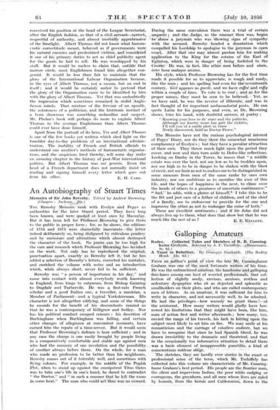Memoirs of Sir John Reresby. Edited by Andrew Browning.
An Autobiography of Stuart Times
(Glasgow : Jackson.40a.)- . • •
THE Reresby Memoirs- rank with Evelyn and Pepys as authorities for the later Stuart period. They have long been known, and were quoted at least once by Macau!ay. But it has been left for PrOfessor Browning -to give them to the public in proper form ; for, as he shows, the editions of 1734 and 1875 were shainefully inaccurate—the latter indeed deliberately so, .being disfigured by ridiculous prudery and by omissions-and alterations which almost destroyed the character_ of the book. No praise can be too high for the care and research which Professor Browning has lavished on the work. Not only has he reproduced the original, punctuation apart, 'exactly. as Reresby left it but he has
dded a of Reresby's letters, corrected his inistakeS, and enriched the volume with notes and an introduction which, while always short, never fail to be sufficient.
Reresby was " a person of importance in his day," and came into contact with almost everybody worth knowing in England, from kings to cutpurses, from Bishop Gunning to Dugdale and Turbervile. He was a first-rate French scholar and a good Italian one, a traveller, a musician, a Member of Parliament—and a typical Yorkshireman. His character is not altogether edifying, and some of the things he records for the benefit of his descendants remind us that he was a contemporary of Killigrew and Sedley. Nor has his political conduct escaped censure ; his desertion of Buckingham when Buckingham was falling, and certain other changes of allegiance at convenient moments, have earned him the reptite of a time-server. But it would seem that Professor Browning's defence is here sufficient ; and in any case the charge is one easily brought by people living in a comparatively comfortable and stable age against men who had the memory of one revolution and the possibility.; of another always before them. On the whole, for a man who made no profession to be better than his= neighbours, Reresby comes out of it tolerably well, and sometimes with flying colours. For example, in the middle of the •• Popish Plot, when to stand up against the omnipotent Titus Oates was to take one's life in one's hand, he dared to contradict " the Doctor," and " in such a manner that he left the room in some heat." The man who could act-thus-wet no coward. During the same convulsion there was a trial of certain suspects ; and 'the; Judge., -as the . m'anner then was, began to' abase' a juryman who was Ithowing -signs of sympathy with the accused. Reresby headed a deputation which compelled his Lordship to apologise to the juryman in-open coin._ • After that' one- may almost pardon him for making application to the King for the estates of the Earl of Eglinton, which were in. danger of being forfeited to the CroVitee- He wai, in fact, like other men before and. since, inter bona malaque mixtus.
His style, which Professor Browning has for the first time
made it possible for us to appreciate, is rough. and ready, like the man ; and his spelling bad even for thiiseventeenth century. Girl appears as guerle, and we have coifed and toffy within a couple of lines. To vote is to voat ; and as for the proper names, they must be seen to be believed- Yet, as we have said, he was the reverse of illiterate, and-- was in
fact thought of for important ambassadorial posts. .He can quote Latin for his purposes, and even, as Dr., Browning shows, tries his hand, with doubtful suceesS, at poetry :
" Knowing your love to th' state and the politicks, Although my knotty muse has gat the rickitts, I'll tell you of a suttle plott in verse
Newly discovered,. brief-as Doctor Pierce."
The Memoirs have not the curious psychological interest
of Pepys' Diary, nor do- they Show the somewhat wearisome complacency of Evelyn's ; but they have a peculiar attraction of their own. They throw much light upon the period they
cover, and now and then turn aside to Defoe-like reflections. Looking on Danby in the TOwer, he muses that " a middle estate was ever the best, not .soe low as to be trodden upon, nor soe high as to be in danger to be shaken with the blast
of envie, not soe lazie as not to endeavour to be distinguished in
some measure from men of the same ranke by ones own industry, nor soe ambitious as to sacrafiee the ease of this life, and the hopes of happiness • in the next, to clime over the heads of others. to a greatness of uncertain continuance."
"And,"_ he adds, with a glance at himself,'_. I take this to be the fitt and just care of a father of children, and Of the chief of .a family, soe to endeavour to prOvide for the one and
. improoye the other.as not,to endanger the ruin of-both." These are excellent Sentiments ; and if Sir John did not always live up to them, what does that show but that he was










































 Previous page
Previous page